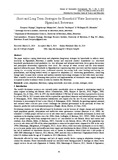Short and long term strategies for household water insecurity in Ngamiland, Botswana

View/
Date
2014-05-16Author
Kujinga, Krasposy
Mmopelwa, Gagoitseope
Vanderpost, Cornelis
Masamba, Wellington R.L.
Publisher
Canadian Center for Science and Education, http://www.ccsenet.orgRights
This is an open-access article distributed under the terms and conditions of the Creative Commons Attribution license (http://creativecommons.org/licenses/by/3.0/).Rights holder
Copyright for this article is retained by the author(s), with first publication rights granted to the journal.Type
Published ArticleMetadata
Show full item recordAbstract
The paper analyses coping (short-term) and adaptation (long-term) strategies by households to address water insecurity in Ngamiland, Botswana, a middle income and semi-arid country. Quantitative (i.e. structured household questionnaires) and qualitative (i.e. key informant and informal interviews,focus group discussions and participant observation) approaches were used. The concept of water security and the actor-oriented approach inform the paper. Households in Ngamiland are experiencing water insecurity and they mainly employ coping (i.e. accessing untreated water, traditional rainwater harvesting, bulk water hauling and buying, use prioritization, and buying bottled water) as opposed to adaptation (i.e. abstracting groundwater, connecting storage tanks to main water systems and modern rainwater harvesting) strategies to deal with water insecurity. More scientific research for informing water policies and implementation of sustainable water supply strategies is required in order to enhance water security in countries like Botswana.
Collections
- Research articles (ORI) [270]
